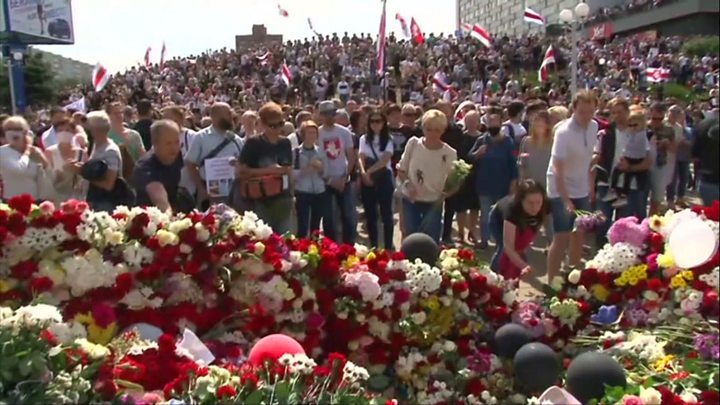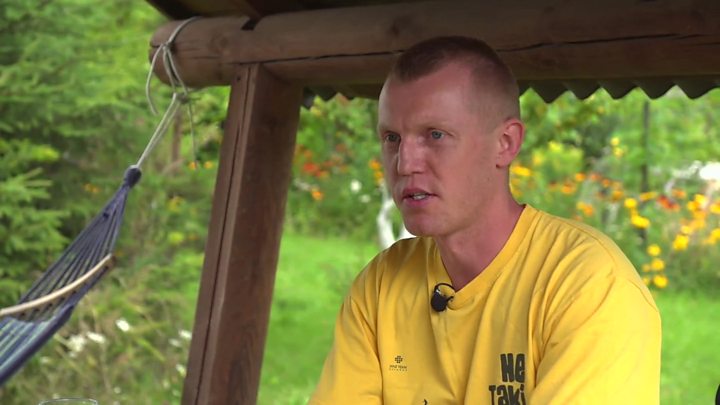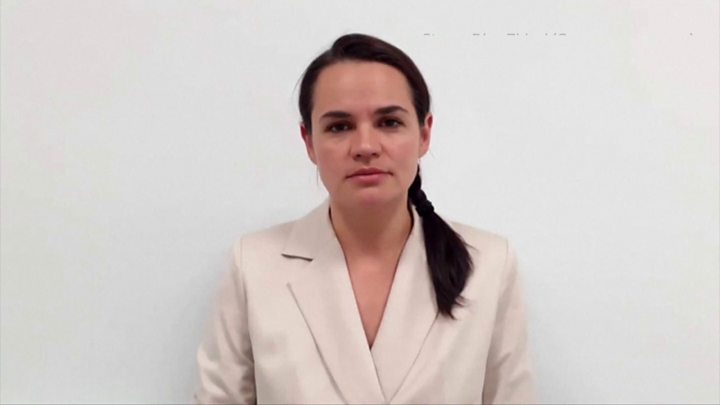Image copyright
Reuters
A pro-government demonstration in central Minsk has so far been small
Opponents of Belarusian President Alexander Lukashenko are set to gather for another day of protest in Minsk over disputed elections last weekend.
The “March for Freedom”, planned for Sunday afternoon, comes amid growing anger over alleged poll-rigging and police violence at subsequent protests.
Meanwhile several hundred supporters of Mr Lukashenko have been holding their own rally in the city.
Reports say some state sector workers are being forced to attend.
The rallies are taking place after Mr Lukashenko said Russia had agreed to offer security assistance in the case of external military threats.
Mr Lukashenko also voiced concerns over Nato military exercises taking place in neighbouring Poland and Lithuania.
The unrest erupted after Mr Lukashenko claimed a landslide victory in last week’s election, the result of which has been condemned amid widespread allegations of vote-rigging.
The Central Election Commission says Mr Lukashenko, who has been in power since 1994, won 80.1% of the vote and the main opposition candidate Svetlana Tikhanovskaya 10.12%.
But Ms Tikhanovskaya insists that where votes were properly counted, she won support ranging from 60% to 70%.
What is happening in Minsk?
A pro-government demonstration was called for midday local time (10:00 GMT). Mr Lukashenko himself is thought to be in attendance.
“All those who love their Motherland and are against splitting the country into two opposing sides will gather for this rally,” organising group Belaya Rus said on Facebook.
Video posted on social media showed columns of buses on the roads and arriving in Minsk from other cities.
However, reports say the numbers at the rally have been small so far, with Russian news agency Tass reporting 400 attendees.
The BBC’s Abdujalil Abdurasulov in Minsk says security at the rally has been turning away journalists, and a security officer explained that not everyone planning to come had arrived.
There are reports of state sector workers being forced to attend or face the threat of losing their jobs. For days, workers at state-run factories have staged walkouts and many have joined street marches against the president.

Media playback is unsupported on your device
Two hours later his opponents will hope to bring out thousands of people for their march, called by Ms Tikhanovskaya who fled into exile in Lithuania a day after the election.
They have taken to the streets all week, and on Saturday evening they staged rallies outside the state television building.
Image copyright
Reuters
Thousands complained that the state broadcaster gave a skewed picture of the protests
Some 100 TV staff came out to join them saying they planned a strike on Monday.
Several journalists have resigned over negative coverage of the demonstrations.
More about the protests in Belarus
Earlier on Saturday, thousands of people waved flags, lit candles and laid flowers at the scene close to the metro station where one of the protesters, Alexander Taraikovsky, died on Monday.
Many opposition supporters chanted “Leave!” – a call for President Lukashenko to resign – and some carried signs with slogans against police violence.

Media playback is unsupported on your device
The circumstances of Mr Taraikovsky’s death are unclear.
Officials say he died when an explosive device went off in his hand during a protest, but his partner, Elena German, told the Associated Press news agency that she believed the 34-year-old was shot by police.
How will Russia respond?
Russian TV news bulletins have been making ominous parallels between Belarus 2020 and Ukraine 2014.
Ukraine’s pro-Western revolution led to Moscow sending in its special operations forces to annex Crimea and Russian military intervention in eastern Ukraine.
Six years on, could Russia’s military intervene in Belarus?
On paper, at least, such a move would appear counter-productive. The opposition movement in Belarus is not anti-Russia/pro-Europe – it is anti-Lukashenko. If Russia were to send in troops to shore up the Belarusian leader, it risks alienating the Belarusian people and creating anti-Moscow sentiment.
True, Moscow is determined to keep Belarus within what it sees as Russia’s sphere of influence. The Kremlin’s ultimate goal is deeper integration with its neighbour – a fully-fledged union state (with Vladimir Putin at the helm). It could still achieve this through political leverage.
The Kremlin has a pathological fear of “coloured revolution” on its doorstep. But Minsk 2020 is not Kyiv 2014. Belarus is not choosing between East and West. The Belarusian people are outraged by the brutality of their security forces. So much so that even Mr Lukashenko’s traditional base – including the state factory workers – are deserting him.
What’s happening politically?
As the unrest continued on Saturday, Mr Lukashenko sought help from Russian President Vladimir Putin.
Mr Lukashenko said President Putin had promised to provide what he called comprehensive assistance in the event of external military threats to Belarus.
According to a Kremlin statement, the leaders had “said they were sure that all the problems would be dealt with in the near future”, but made no mention of a Russian offer of assistance. It emphasised that the conversation had taken place on the initiative of the Belarusian side.
Mr Lukashenko’s announcement came the day after EU foreign ministers agreed to prepare new sanctions against Belarusian officials responsible for “violence, repression and the falsification of election results”. The US has also condemned the election as “not free and fair”.
In a joint statement on Saturday, meanwhile, the prime ministers of three Baltic republics – Latvia, Lithuania and Estonia – “expressed deep concern at the violent crackdown… and the political repression of the opposition by the authorities”.

Media playback is unsupported on your device
Lithuania and Latvia have previously said they are prepared to mediate in Belarus, provided the authorities stopped violence against protesters and formed a national council with members of civil society. They warned that the alternative was sanctions.
The leaders said the presidential election was “neither free nor fair” and called for a “transparent” vote “with the participation of international observers”.
Ms Tikhanovskaya left for Lithuania following the election after she publicly denounced the results. She had sent her children to Lithuania for safety before the vote.
Some 6,700 people were arrested in the wake of the election, and many have spoken of torture at the hands of the security services.
Amnesty International said accounts from released detainees suggested “widespread torture”.